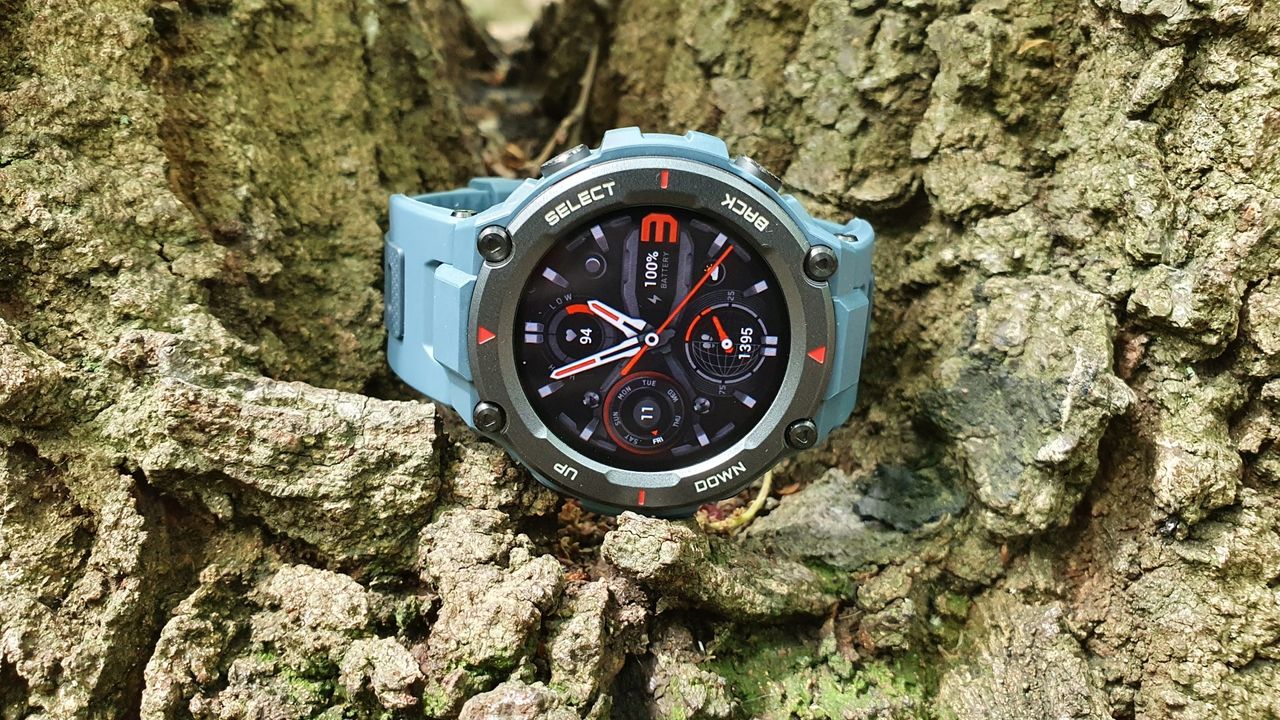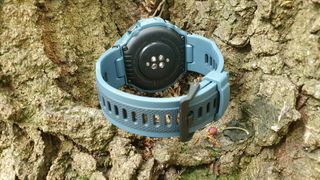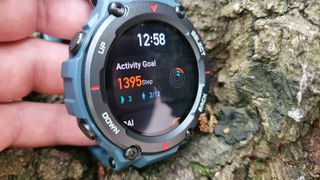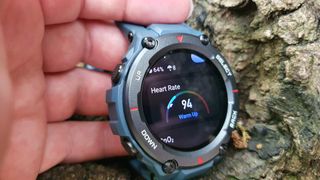Amazfit T-rex Pro review: a basic, budget outdoor watch that could do with more bite
The Amazfit T-rex Pro outdoor watch comes in light, hot and packing a kitchen sink of tech – but is it any good? Here's our review

Wallet-friendly and packed with tech, the Amazfit T-rex Pro offers oodles of basic functionality but little in the way of sophisticated coaching or training tools.
-
+
Lots of sensors
-
+
Excellent screen
-
+
Easy to use
-
-
Basic data management
-
-
No navigation
Why you can trust T3

The Amazfit T-rex Pro is a full-featured smartwatch, the successor to the Amazfit T-Rex, itself first unveiled at CES 2020. This duo of smartwatches are manufactured by Zepp Health Corp – previously called Huami Corp – which also makes a range of less outdoorsy smartwatches. The Amazfit T-rex Pro is available now, priced at UK £139, US $180. Is it fit to sit amongst today's best outdoor watches? Read on for our full Amazfit T-rex Pro review.
- Just going running? Here are the best running watches
- Want a bigger screen? Try one of the best hiking GPS instead
Amazfit T-rex Pro review: design and build
The design is the most obvious marmite element of the Amazfit T-rex Pro, a vaguely ‘80s take on a rugged outdoors watch, an impression aided by the data-rich watchface. It’s something you either like or don’t, and we’ve heard both points of view expressed quite vocally. Beyond that initial impression, there’s plenty to get on with here. The four buttons sit in the corners, each helpfully labelled as part of that 80’s styling. They’re knurled for easier operation, but sit relatively flush so are a little ‘hit and hope’ when wearing gloves. A protective polycarbonate bezel protects the super-bright recessed AMOLED screen, itself covered with tempered glass sporting an anti-fingerprint coating which actually works.

The 22mm silicone strap does the job, and is unfortunately not a standard quick release model, but there are plenty of options on the usual retailers for replacements. Around back, there’s a four-sensor array mounted in the polycarbonate, and two metal contacts for the magnetic charger, which won’t let you connect it the wrong way around - neatly done.
The Amazfit T-rex Pro claims to have passed 15 military-grade tests, three more than the Amazfit T-Rex, which apparently mean the watch can withstand extreme temperatures -40°C to 70°C as well as humidity, ultra-dry conditions and salt spray. It’s also shock-resistant and 10 ATM water-resistant, so OK with splashes, snow, showering, swimming, snorkeling, or non-high-speed watersports.
The sensor array is where the Amazfit T-rex Pro really shines though, offering support for four satellite systems (GPS, GLONASS, Beidou, Galileo) to get more accurate fixes faster, as well as a blood-oxygen saturation measurement system, heart rate monitoring including zones, and a compass and barometric altimeter. Basically, the kitchen sink.

Amazfit T-rex Pro review: performance
Once again, the sensors really shine, delivering basic information depending on the sport profile chosen. However, there are gaps here, most obviously the usability of the data being collected and post collection. For example, while running it’s easy to see your heart rate at a glance, but there’s no way to set a zone and alerts if you leave that zone, making HR zone training a manual process. There’s also not much you can do with your data once it’s in the app, apart from posting your latest workout on your social channels. This does rather shut out Strava, MyFitnessPal or RunKeeper users, as you're building another data silo in this world of Zepp.
There are deeper weirdnesses too, although there are 4 satellite constellations supported, you can only select three options to link GPS with, you can’t use GPS with GLONASS and Galileo for example. That said, the GPS tracking is perfectly adequate, but this is workout tracking only, no navigation, so feels a little light compared to more powerful competitors.

Battery life is pretty solid, a claimed 18 days for ‘typical use’ and a reasonable 40 hours of continuous GPS working time. That said, in testing battery life dropped off relatively rapidly with GPS use, eating between 5-10% in just an hour or so, making those headline figures on the generous side. That said, you’ll easily get a week’s use from a single charge, which isn’t too shabby at all.
All those sensors provide lots of bells and whistles, the blood-oxygen saturation measurement system is fun and great for these Covid times, but otherwise slightly unusual. The weather tracker is quite useful and surprisingly reasonably accurate, aided by GPS positioning, current moon phase display is interesting, but it’s all a bit scattergun.
The companion app displays your fitness data in a coherent format, and it’s easy to scroll through and get a general idea of your state of health, but there’s no coaching or explanations here, so any targeted training will need to be designed yourself.
Overall, the performance is promising, but the outputs are pretty basic. That said, you’ll need to spend at least triple the money on a Suunto or Garmin with proper training tools, which puts things into perspective somewhat.
Amazfit T-rex Pro review: specs
- Screen: 1.3" Color AMOLED, Resolution 360 x 360
- Size: (dial) 47.7 x 47.7 x 13.5mm
- Weight: 59.4g (with strap)
- Positioning: GPS+GLONASS/ GPS+BeiDou/ GPS+Galileo
- Body Materials: Polycarbonate
- Strap Materials: Silicone rubber
- Water-resistance: 10 ATM
- Battery Life: Typical use 18 days/ Continuous GPS 40 hours
Amazfit T-rex Pro review: verdict
The Amazfit T-rex Pro is in many ways very impressive, the battery life is good, it’s easy to strap on and use, and the sensors are diverse. It’s extremely budget-friendly pricing means it’s easy to forgive many of the omissions and the basic functionality in parts, but the lack of data insight is arguably the biggest challenge.
Suunto and Garmin have put years of research into the algorithms and coaching tools that really elevates their products, making them easy to get insights and performance improvements that just won’t happen with the Amazfit T-rex Pro – unless you do the planning work yourself. However, if that’s what you planned to do anyway, then the Amazfit T-rex Pro is a great – if basic – fitness tracker watch.
Amazfit T-rex Pro review: alternatives to consider
As the Amazfit T-rex Pro sets the budget bar very low indeed, alternatives are a mixed bag. The Garmin Fenix 5 is only slightly more expensive, and offers a much more rounded package, even in spite of its age, while a Suunto 5 could also be an option for a slight price bump.
As for more expensive options, check out the Polar Grit X. There are many features and training tools to love on the Polar Grit X, especially the extra insights that trail and mountain athletes are going to benefit from, such as Hill Splitter, FuelWise and WeatherWatch. It’s lighter and smaller than you’d think a watch of this capacity is going to be, easy to navigate and boasts up to 40 hours battery life in full activity mode.
There is also the Coros Vertix, Coros' best adventure watch. This is a is a competent adventure smartwatch: water rated up to 150 metres, built from high-quality materials and has an extremely long battery life. But while Coros delivers extreme physical solidity, the Vertix falls a little somewhat short when it comes to features and performance.
Sign up to the T3 newsletter for smarter living straight to your inbox
Get all the latest news, reviews, deals and buying guides on gorgeous tech, home and active products from the T3 experts
Mark Mayne has been covering tech, gadgets and outdoor innovation for longer than he can remember. A keen climber, mountaineer and scuba diver, he is also a dedicated weather enthusiast and flapjack consumption expert.
-
 Apple CarPlay 2 officially delayed, but that could be for the best
Apple CarPlay 2 officially delayed, but that could be for the bestIt could make for a better experience when it finally lands
By Sam Cross Published
-
 The best show on TV right now is available to stream for free
The best show on TV right now is available to stream for freeForget Netflix and Apple TV+, BBC iPlayer is home to the best TV show you can stream today
By Rik Henderson Published
-
 Google's Gemini AI smart home controls are now available to everyone
Google's Gemini AI smart home controls are now available to everyoneIt's expected to roll out over the coming weeks
By Lizzie Wilmot Published